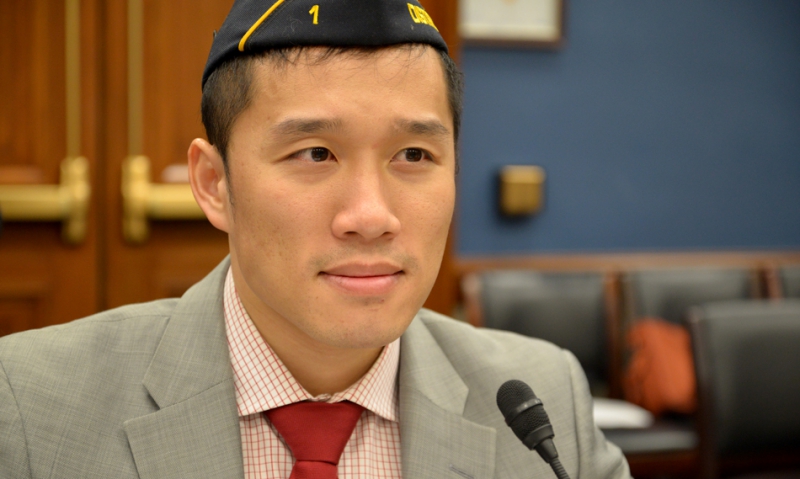
Testimony amplifies position that veteran-owned companies need fewer obstacles to federal contracts.
Veteran-owned small businesses must be treated fairly, especially when pursuing federal contracts, an assistant director for The American Legion’s Veterans Employment and Education Division told members of Congress Thursday.
“The government has a fiduciary responsibility to treat small business fairly and not take advantage of its buying power and become predatory,” the Legion’s Davy Leghorn said in a hearing before the House Committee on Small Business Subcommittee on Contracting and Workforce. “The American Legion appreciates the goal of lowering federal expenditure through competitive contracting initiatives, but we are concerned that misuse of non-governmental platforms could put veteran small businesses at risk and limit job creation.”
Leghorn highlighted three main issues that pose obstacles for veteran-owned small businesses:
- Reverse auctions
- Differences between Small Business Administration and Department of Veterans Affairs procurement standards
- Exclusion of veterans from Disadvantaged Business Enterprise programs
Regarding reverse auctions, the Small Business Act should apply government-wide, not just to the Small Business Administration (SBA), Leghorn argued. The American Legion is also concerned that reverse auctions will lead to decreased quality because the platforms encourage vendors to provide the cheapest products and services in order to maintain the smallest profit margins to stay competitive. The government is therefore purchasing substandard products and services because reverse auctions steer agencies to shop for lowest pricing and not the best value.
“The American Legion appreciates the goal of the government contracting community to lower federal expenditure through competitive contracting initiatives,” Leghorn said. “But we are concerned that misuse of non-governmental platforms that have not suffered the scrutiny of the appropriations process, are putting veteran-owned small businesses at risk and could also be serving to undermine the entire procurement process.”
When it comes to VA’s First Contracting Program, many veterans find the verification process burdensome. The process of verification involves a review of a business’ governance documentation and a determination about whether the documentation is in compliance with VA’s Center for Verification and Examinations (CVE) legal requirements for admittance into the Veterans First Contracting Program. The main challenge with the program is striking the appropriate balance between the amount of government intrusion necessary to verify a business and the amount of government oversight necessary to protect the integrity of the program.
In 2012 and 2013, The American Legion counseled nearly 50 small business owners who had questions about the verification process. In 2014 that number was cut in half, as fewer small business owners sought counseling services, a possible indication that VA’s Center for Verification and Examination has made changes to improve the process and cut down on wait time. This trend could also be the product of a combination of VA diminishing the backlog of applications in the queue and extending the time a small business can remain on verified status from one to two years.
“The main challenge with the VA verification is striking the balance between the amounts of intrusion necessary to substantiate size, ownership and control, and the requisite amount oversight to protect the integrity of the program,” Leghorn said.
Leghorn also asked the committee to consider implementing a single set of standards for all Service-Disabled Veteran-Owned Small Businesses (SDVOSB) to contract with the federal government. He also noted that SBA and the VA should work together to minimize inconsistencies.
By law, the federal government is mandated to award no less than 3 percent of all federal contracts to SDVOSBs. For a number of reasons a few agencies have not met this goal. One of the most egregious exclusion of veterans owned small businesses occurs in the Department of Transportation's Disadvantaged Business Enterprise (DBE) program, which mandates that states receiving federal dollars for infrastructure repairs have to set aside 10 percent for “preferred groups” of small businesses.
“It is a misconception that this 10 percent is solely relegated to road and infrastructure construction firms,” Leghorn said. “This is an issue that affects all veteran owned small businesses.”
The American Legion worked closely with Rep. Mike Fitzpatrick (R-Pa.) to amend current legislation to add “veteran-owned small business concerns” as a separate line to the list of entities eligible.
In previous congressional sessions, Fitzpatrick introduced the Fairness to Veterans for Infrastructure Investment Act, implementing this change.
Leghorn closed out his remarks thanking the committee for its support and noted that although improvements have been made, the hard work is not over yet. “The American Legion and numerous other veterans service organizations support this bill and will ask again for this committee’s support when Congress reauthorizes the federal highway bill,” he said.
- Legislative

